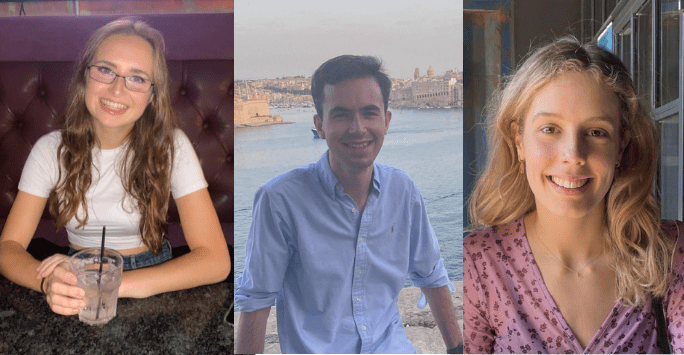
Choosing to complete an intercalated degree on top of the MBChB programme is a fantastic opportunity, which many of our student doctors choose to undertake as an investment in their personal development and future career path.
To help enable this, we were delighted to introduce a series of School Scholarship Awards this year to support student doctors wishing to intercalate at the University of Liverpool. This year, the School awarded over £60,000 in Scholarships of between £1000 and £5000 in the form of fee waivers to a total of 18 recipients.
A proportion of the awards are linked to students who need to access hardship support or fulfil widening participation criteria, to ensure intercalation options are accessible to all and maximise opportunities for those who wish to intercalate.
Here, we check in with some of the student doctors who were successful in their applications for intercalation Scholarships to learn more about their chosen intercalated degree, the Scholarship application process and their top tips for students looking into intercalation for next year:
- Shantanu Kundu, Maya Nelson, Daniel Cooke and Alice Halliday who are beginning an MSc in Acute Critical and Emergency Medicine.
- Lily Jones, Matthew Heneghan, Keziah Davies and Julien Marro, all starting an MPhil in Child Health.
- Jennifer Lawlor taking a Master of Law in Law, Medicine and Healthcare.
- Alastair Patefield who is starting a Master of Research Clinical Sciences.
- Aditya Chezhian who will be completing a Master of Research in Biomedical Sciences & Translational Medicine.
- Alastair Patefield who is starting a Master of Research Clinical Sciences.
- Will Purcell beginning an MSc in Clinical Ophthalmology and Vision Science.
- Prince Josiah Joseph taking an MPhil in Clinical Sciences.
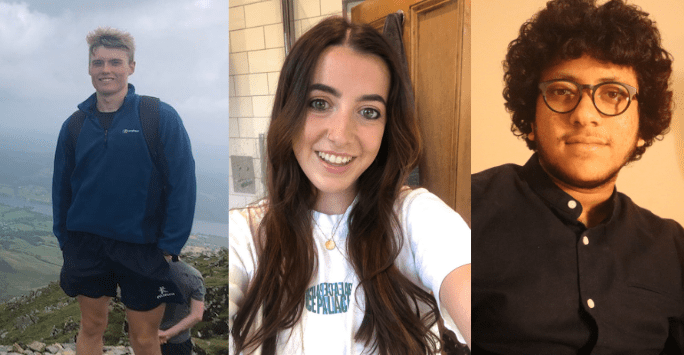 (L-R) Award recipients Daniel Cooke, Maya Nelson and Shantanu Kundu
(L-R) Award recipients Daniel Cooke, Maya Nelson and Shantanu Kundu
Why this choice of intercalation programme?
Shantanu: Acute medicine has always been a passion of mine. On placement, I have seen the importance of acute, critical and emergency medicine in saving lives but also improving the quality of life later down the line. Being part of a team of clinicians, making important decisions is something that I would love to do.
Maya: For me, this course covers everything I want to learn and experience in my intercalated degree.
It will give me hands-on experience in A&E, AMU, ICU and the trauma department, ensuring I can perform well in extremely high-pressure environments.
There is also a large research component across the different specialties where I will be working with supervisors who are at the top of their field.
Daniel: I’ve been really interested in anaesthetic teaching and this course is obviously very relevant for this area of medicine. I really like how transferable the skills gained from this degree will be, as having a good understanding of how to manage a patient who’s deteriorating quickly will be very practical within any specialty.
Alice: I wanted to take a year away from the MBChB programme however, when looking at the intercalation options, I found the ones that interested me the most were closely related to medicine, and I realised I would miss clinical work greatly. I was delighted to find the ACE medicine course through which I can develop my research skills and writing ability whilst continuing to develop clinical knowledge and skills in an area I am interested in.
Lily: After seeing an advert for the course in the student bulletin, I was keen to explore further so I attended an online Paediatric MPhil Intercalation Talk from Professor McNamara organised by Liverpool Paediatrics Society. Following this talk, I read through the 37 MPhil vignettes online and found a project which really excited me, encompassing everything that I wanted out of my intercalation year.
For me, it was important to find a project which would not only give me lots of opportunities to broaden my research skills, but also had lots of patient contact.
Matthew: I knew I wanted to intercalate because of the extra skills that come with completing another degree. I started looking for degree programmes halfway through second year and made a list of potential courses that caught my eye. In the winter of year 3, applications opened for the MPhil in Child Health and I saw that one of the potential topics you could focus your project on was cystic fibrosis, something I’d been interested in since before coming to university, that’s the reason I applied.
Keziah: During my year 3 paediatrics placement, I spent time in the Neonatal Unit and loved it! I already knew I wanted to go down the research route for my intercalation year, so I applied for the MPhil in Child Health with a keen interest in finding a neonatology project. The department lined up several great projects and I selected one which will investigate the relationship between parenteral amino acid intake in very preterm infants under 26 weeks, biochemical profile and their infection outcomes.
Julien: I wasn’t too sure whether to intercalate or not as initially I didn’t find a degree I was really interested in. Whilst doing my RS3 my supervisor told me about some of the MPhil projects available, I looked into it and decided to apply! This was the opportunity to focus on a project for a whole year, as well as gain research skills, undertake experimental work and be involved in a larger study.
Alastair: My grandfather has been an inspiration for me. Despite only having one eye, he became an international professor in chemistry.
Our relationship, his stories and the experiences of other patients are a motivation to me to strive to be involved in the work to achieve blindness prevention in those cases where blindness is avoidable and treatable.
Intercalation will give me the opportunity to undertake projects in the pioneering areas of long-acting retinal injections, corneal imaging and artificial intelligence and sustainability in global health.
Jennifer: I’ve always had a strong interest in medical ethics and debating, so the LLM is a great way of delving further into this whilst challenging myself at the same time.
Aditya: I've always been interested in medical research and have enjoyed the RS programme every year which is what led to me to undertake a Master of Research.
Will: It gives me the opportunity to explore the specialty in depth, the chance to work with patients and develop clinical and history taking skills as well as having a strong research focus, which is something I wanted.
Josiah: I wanted to gain advanced skills and experience in clinical research, and I believe that completing an MPhil will help me make decisions in the future with regards to a PhD. Joining a research group will also open up future research opportunities even after the intercalation year has finished.
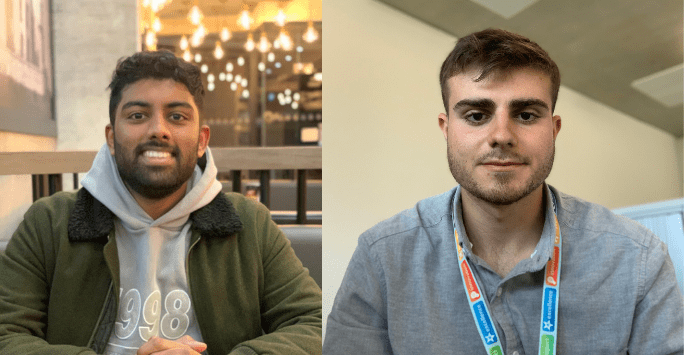 (L-R) Scholarship recipients Prince Josiah Joseph & Julien Marro
(L-R) Scholarship recipients Prince Josiah Joseph & Julien Marro
What are you most looking forward to?
Shantanu: I love the fact I will get to work on projects within hospitals with leading researchers and clinicians.
I want to be able to help people during stressful situations and would love to apply what I learn to my career and personal life.
I am really looking forward to contributing to research and being part of new and developing interventions.
Maya: The placements in A&E and Aintree trauma department as I hope to see things I’ve never seen before and become a part of the team making life-saving diagnoses and decisions.
Daniel: Definitely the clinical placements the course offers, the chance to work and be taught within these teams in some of the biggest hospital departments around Liverpool is a really valuable opportunity.
Alice: Meeting new people and being able to work closely with my Clinical Educational Supervisor. With a smaller cohort and time set aside to work together, I’ll have the opportunity to develop a professional relationship and gain invaluable insights and clinical lessons whilst working alongside them. I am also looking forward to learning about a certain section of medicine in more detail and being able to become more part of the team involved.
Lily: The new challenge of focusing on and exploring one area of Medicine in depth. In this early stage of my training, I find it an exciting and unique opportunity to spend a year imbedded in a team of professionals working at the forefront of science. I am really looking forward to spending next year at Alder Hey, working with girls with Tuner Syndrome and their families.
Matthew: I started work as a healthcare assistant at Liverpool Heart and Chest Hospital before joining the School of Medicine, and I’ve worked a number of shifts on the cystic fibrosis ward.
I have no doubt that starting my research on the drugs that made a huge difference to those patients’ lives will be extremely rewarding.
Keziah: The opportunity to extend and develop research skills which will help me to pursue an academiac career alongside a clinical one in the future. I’m also excited to spend time learning from my supervisor and the neonatal team at the Women’s Hospital. I’d like to incorporate a clinical element and spend time on the ward too.
Julien: I hope to develop a broad range of research skills that will definitely benefit me in my future career as a clinician. I am also looking forward to gaining scientific laboratory skills.
Alastair: Collaborating with my research team, contributing and building opportunities for scientific clinical discovery. The increased knowledge about the reasons for patients’ pathology and treatments will help me grow in confidence in my interactions with patients.
Jennifer: Developing my understanding of the law and ethics in medicine, as well as talking through controversial topics with my peers in seminars. I’m also looking forward to meeting new people on the course.
Aditya: The opportunity to work in the lab and take part in cutting edge research with clinicians and researchers who are experts in their respective fields.
Will: The clinical placements and the chance to get involved in ophthalmology-based research.
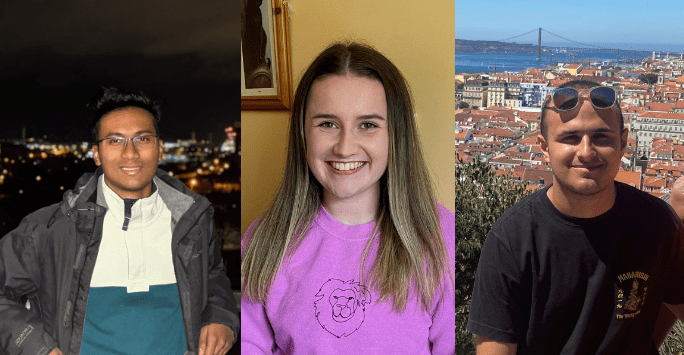 (L-R) Award recipients Aditya Chezhian, Jennifer Lawlor and Will Purcell
(L-R) Award recipients Aditya Chezhian, Jennifer Lawlor and Will Purcell
What is your top tip to students considering applying for an intercalation Scholarship?
Shantanu: I didn't expect to be awarded a Scholarship. You don't have to be a world expert in the course you want to study. I spoke about myself - my research experience, charitable work and what I enjoy. Don't stress about the subject and what you think they want to hear. Be yourself, show them your passion for medicine and the rest will follow.
Maya: Applying for the scholarship was a bit of a stab in the dark so I was completely delighted when I received one. I would say to anyone thinking of applying to definitely do so. It may take a bit of time, but it is completely worthwhile. I’ll now be able to focus more on the degree and less on the financial side.
Daniel: I wasn’t actually considering applying for a Scholarship until I was encouraged to by my flatmate as I thought it would be too competitive. I’d advise any students considering applying to not discount yourself and to just give it a go!
Alice: I found the process relatively straightforward. I was informed of the opportunities available and I sat down to work out which scholarships applied to me (and how much I could get for each of them). After selecting one, I filled out the necessary forms and got a reference to send off. My tip: don’t be afraid to apply even if you do not have any set ideas about research projects. Have a think about what you are interested in and outline it, this will show you have viable ideas.
Lily: The Scholarships were well advertised in the student bulletins and the online application form was relatively short and self-explanatory.
I would really recommend establishing a good relationship with your Academic Advisor early on, as their support throughout your intercalation applications can be invaluable.
Matthew: The application process was simple to follow and very accessible if you give yourself enough time. As part of the process, you will need to obtain an academic reference. Ensure you give the person who’s writing the reference enough time to meet the deadline, and take time to think carefully about the responses you give to the questions on the application form. So overall, be sure to start early.
Keziah: The financial side was a big consideration for me, so I decided to apply for a scholarship. My top tip would be to start looking for funding opportunities early especially if you’re worried about the cost, some applications can be lengthy but worth spending extra time on.
Julien: An important factor in choosing my intercalated degree was the cost, which is lower compared to taught masters. The application process for a scholarship is similar to a personal statement. Take your time and don’t apply last minute! Contact your referee in good time - RS supervisors and Academic Advisors are usually good people to go to.
Alastair: I found the application processes a rewarding challenge. Alongside studying, good time management is key to making a successful application. I started working on my application a few months in advance of the deadline which meant it could be as a good as possible. Also don’t be shy asking previous winners of intercalation scholarships for advice. Starting early was advice passed down to me from such a student!
Jennifer: I found the process incredibly straightforward. Information was readily available from the student intranet, and the intercalation team were quick to respond to any questions that I had.
I’d encourage every year three student to consider applying for an intercalation Scholarship.
Aditya: The School provided a clear and easy way to send in your application online. The biggest tip I have is to clearly and honestly express in your application what is motivating you to intercalate, no matter what the reason may be.
Will: Give it a go! I never thought I’d be successful but I applied anyway, and I’ve secured significant financial help for my studies. Make sure to include any relevant experience - teaching and society roles look good on an application.
Josiah: The application process is very straightforward. If you’re ever on the fence between applying and not applying, just apply! I was in the same position and submitted my application just in time and ended up getting a scholarship. However, I would advise people to start the application early to give your potential referees plenty of time.
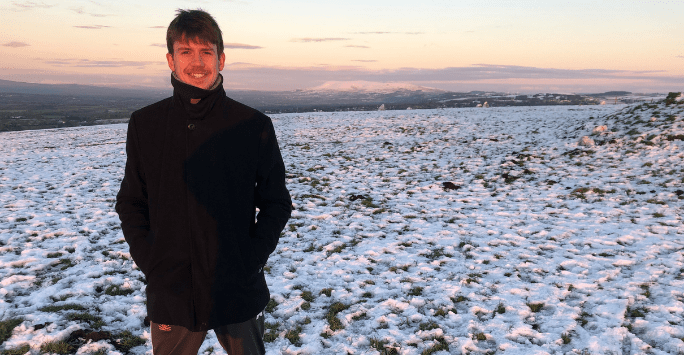 Student Doctor Alastair Patefield received Scholarships from the School and Wolfson Foundation
Student Doctor Alastair Patefield received Scholarships from the School and Wolfson Foundation
Wolfson Foundation recognition
Alongside the School of Medicine Scholarship Awards, three students have also obtained a prestigious Wolfson Foundation Intercalated Scholarship. This award is administered by the Royal College of Physicians to outstanding undergraduate students who are likely to pursue a medical research career.
Student Doctors Alastair Patefield, Lily Jones and Keziah Davies were selected to receive a Scholarship from the Wolfson Foundation.
Keziah says, “I was delighted to hear that I had been successful in securing additional funding from the Wolfson Foundation, who are generously supporting my year of research with a grant of £5,000, to help with general living expenses and any other costs associated with an extra year of study.”
Lily is equally thrilled to have been recognised. “I’m looking forward to investing the award into the exciting year I have ahead of me. I’d like to thank my supervisor Professor Blair for her help and encouragement with my application.”
Congratulations to this year’s Scholarship Award winners and all our student doctors embarking on an intercalated degree! We’ll hear more from them throughout the year to see how they’re getting on.
Discover more
- Interested in pursuing an intercalated degree at the University of Liverpool? Our Intercalation web area (link) has all the details on the opportunities on offer.
- Liverpool student doctors wishing to intercalate at the University of Liverpool can apply for a School of Medicine Scholarship. Take a look at the student intranet (link) for more information.
- Further details about intercalation funding and other scholarship opportunities, including Wolfson Foundation Intercalated Scholarships, are provided on the student intranet (link).